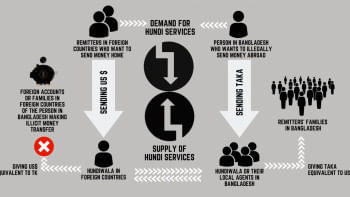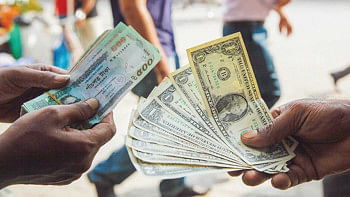Downfall of remittance inflow again

In what is undoubtedly a worrying development, remittance has fallen by 21.5 percent in August – the steepest decline since the peak of the pandemic in 2020. According to the Bangladesh Bank, August's receipts are the lowest in six months. The latest development signals yet another blow to the country's dwindling dollar reserves, which stood at $23.06 billion on August 30 and is projected to slip below the $23 billion mark this week. For a country so dependent on remittance earnings, the situation is beyond concerning.
The decline in remittances – despite an increasing number of Bangladeshis leaving for jobs abroad – has become a persistent trend in recent times due to the growing use of unofficial channels, i.e. hundi. What is most frustrating is that economists have been endlessly warning about the wide difference between the market exchange rates in the official and kerb channels that continues to sway workers to choose the latter. Last Thursday, the exchange rate in official channels was set at Tk 109.5 per dollar, while the rate at kerb market prevailed around Tk 117-118 per dollar. According to a report by this daily, even private banks who can offer more to remitters have to follow the low rate fixed by the Bangladesh Bank. Now, with the growing number of informal channels online, which easily allows them to transfer money and with higher rates, remitters are increasingly eschewing the cumbersome formal process. Can we even blame them?
Instead of wasting energy on chasing those who make and choose the channel of hundi, the authorities should, first and foremost, acknowledge that the taka's artificial overvaluation is the primary reason that hundi has mushroomed over the years. We urge the Bangladesh Bank to pay heed to the warnings of our economists and urgently rethink its misguided policy of artificially fixing the exchange rate. It goes without saying that, given the current volatility of our economy and our ever-dwindling forex reserves, we can no longer afford to stay complacent about the consistent dip in remittances.
It is widely known that workers also prefer informal channels due to the lack of external fees and higher accessibility compared to banks. The government should therefore give further incentives to exchange houses to alleviate the fees of remittances and let private banks develop their own apps for workers to seamlessly transfer their hard-earned money back to their families.
Follow The Daily Star Opinion on Facebook for the latest opinions, commentaries and analyses by experts and professionals. To contribute your article or letter to The Daily Star Opinion, see our guidelines for submission.


 For all latest news, follow The Daily Star's Google News channel.
For all latest news, follow The Daily Star's Google News channel. 









Comments